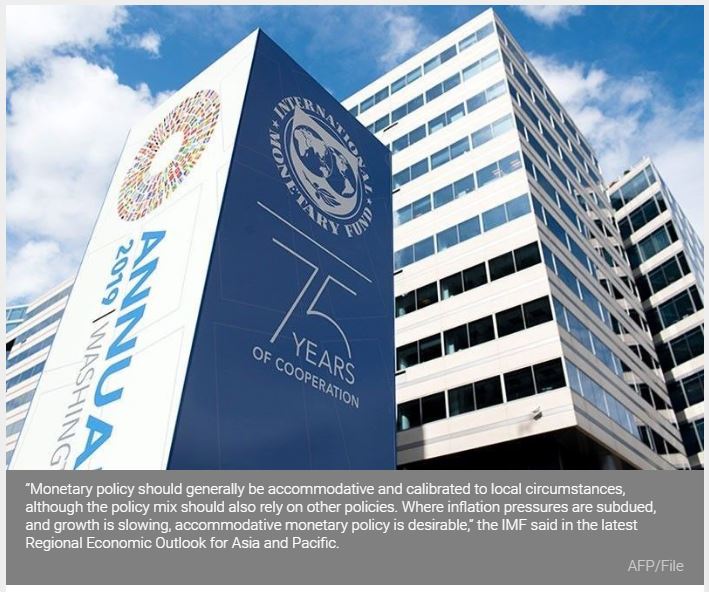Accommodative policy desirable in Philippines — IMF
MANILA, Philippines — An accommodative monetary policy is desirable in the Philippines due to the continued downtrend in inflation as well as slower economic growth, according to the International Monetary Fund (IMF).
“Monetary policy should generally be accommodative and calibrated to local circumstances, although the policy mix should also rely on other policies. Where inflation pressures are subdued, and growth is slowing, accommodative monetary policy is desirable,” the IMF said in the latest Regional Economic Outlook for Asia and Pacific.
The Bangko Sentral ng Pilipinas (BSP) has so far slashed interest rates three times this year for a cumulative reduction of 75 basis points, partially unwinding a tightening episode that saw benchmark rates rise by 175 basis points last year.
Inflation has averaged 2.8 percent in the first nine months after easing to a 41-month low of 0.9 percent in September.
This is a complete reversal of what happened last year wherein inflation accelerated to 5.2 percent from 2.9 percent in 2017 and exceeded the BSP’s two to four percent target due to elevated oil and food prices, particularly rice as well as a weak peso.
This paved the way to a slower gross domestic product (GDP) growth aside from soft global market due to the US-China trade war as well as underspending arising from the delayed implementation of the 2019 national budget.
Aside from the Philippines, the IMF said accommodative policy stance is also desirable in India, Korea and Thailand.
Likewise, the IMF said improved market communications and further strengthening of the monetary policy framework could help lift inflation expectations.
Based on the latest World Economic Outlook released this month, the IMF sees inflation easing to 2.5 percent this year and further to 2.3 percent next year.
However, it has lowered its GDP growth projections for the Philippines to 5.7 percent for this year and to 6.2 percent for next year due to worsening external environment and slower-than-expected GDP growth outcome in the second quarter.
The IMF said growth in Asia is expected to moderate to five instead of 5.4 percent this year and 5.1 percent for next year amid a marked deceleration in merchandise trade and investment, driven by distortionary trade measures and an uncertain policy environment.
“Headwinds from prolonged global policy uncertainty, distortionary trade measures, and growth deceleration in the economies of important trading partners are influencing economic growth in Asia and the Pacific,” it said.
Source: https://www.philstar.com/business/2019/10/28/1963903/accommodative-policy-desirable-philippines-imf#sWgO7dCrJuucprBf.99


 English
English




